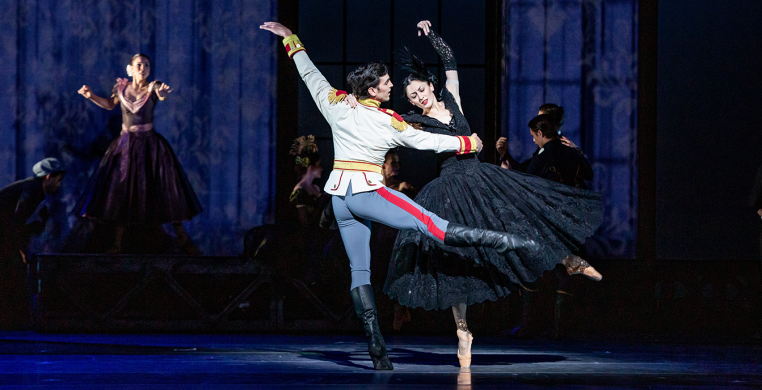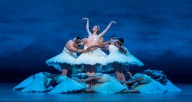Protestors hoisting ragdoll ballerinas marched between the lyric opera house’s towering columns shouting, “Shame on you, shame on you!”
As the dimming foyer lights indicated that the show was about to begin, I snagged one of the protestors to ask what all the fuss was about.
“These artists are from Russia,” said a young woman, “They are going to take the money to Russia and those money [sic] are going to go to bomb Ukraine and kill our families.”
“The Joffrey Ballet?” I asked.
She clarified her point, “No, not the Joffrey. The group they invited here. We are against that. My whole family is at war right now.”
On Feb. 15, The Joffrey Ballet presented “Anna Karenina” at the Civic Opera House, a slight reimagining that premiered almost four years ago to the day. **There was no Russian “group” invited to perform; in fact, the work features choreography by Yuri Possokhov, music by Ilya Demutsky and libretto based on Tolstoy’s novel by Valeriy Pecheykin, who are all indeed of Russian origin— other than dancers Sergei Osminkin and Valeria Chaykina (who has been with Joffrey since 2015) there were no other Russian-born performers in any significant capacity involved in the performance.
As a prelude to the performance, the Lyric Opera Orchestra played Melody by Ukrainian composer Myroslav Skoryk. A booming voice read a quote from Leo Tolstoy, "Nothing can make our life, or the lives of other people, more beautiful than perpetual kindness."
The announcer continued, “Tolstoy's compelling words still ring true. He reminds us that the more thoughtful we are, the more compassion we can find in others. The Joffrey Ballet holds all Ukrainians in our hearts as we hope for a better world and an end to oppression for all people. We dedicate this performance to the people of Ukraine.”
Formerly performed at the Auditorium Theatre, the Civic Opera House feels narrower, more like a movie theatre. This is to the benefit of the performance, which used stunningly sharp images projected onto large, abstract shapes to create scenery and special effects—an eerie train station, lavish ballrooms, a billowing snowfall, the ominous headlight of an oncoming locomotive. Dancers also performed behind a semi-transparent scrim, creating the effect of people being inside and interacting with the projected images.
Russian oligarchs—men in tall, black boots and military uniforms; women in jewel-toned dresses—couple up during a saltatorial opening number, like a folk dance, with over twenty dancers leaping between and lifting one another to a punchy military march. Enter Anna (Victoria Jaiani), who catches the eye of Count Vronsky (Alberto Velazquez), who, to the dismay of other interested parties, literally sweeps Anna (almost) off her feet and pulls her across the length of the floor, her toes skimming the ground.
At home, Anna prances playfully with her son, though with back turned towards her husband—stiff, straight-backed Alexy Karenin (Dylan Guitierrez). With a sharp gesture, Karenin puts an end to the fun, and we get the sense that husband and wife are also deficit in “playtime.” Sensing something missing in her life, Anna begins an affair with Vronsky, whose tryst is visualized by him lifting her high, up over his head, elated, as if she were as buoyant as a balloon.
While attending a horse race, jockeys leap high into the air in double attitude over imaginary hurdles as moving images of horses’ hooves beat the ground behind them. Vronsky takes a tumble and Anna’s emotions betray her, raising the suspicions of her husband, as she leaps from her seat at the sight of her tossed lover.
Feverishly sick in bed, Anna hallucinates a polyamorous pas de trois, imagining a life with both her husband and lover. Both men pick up and fling Anna around effortlessly, like a ragdoll, her legs swinging dangerously close but over their heads.
Fantasy fails to match reality, and Anna is kicked out by her husband; meanwhile, Vronsky, at a party reminiscent of the opening ballroom number (but with creepy, carnivalesque music) sees a ghostly grey image of Anna appear and disappear above him, a haunting premonition.
The technical prowess of the Joffrey dancers is out of this world. They leap like they are unbound by gravity, like astronauts on the moon. Every dancer exudes personality. The military men appear stoic; the high-society women aloof. Jaiani as Anna conveys both elation and despair as much through her large, expressive eyes as she does through her lithe, fluid movements. Possokhov’s choreography is daring and explosive, yet full of warmth. The score by Demutsky is fun and bouncy, but always with the poignant twist of dissonant notes, like a black rose center in a red bouquet.
“Anna Karenina” by the Joffrey Ballet takes a literary classic known for its length and moves it along at a breakneck pace—the show is over before you even realize it! The projected backgrounds and effects give the work a cinematic quality, supported by the venue’s shape and acoustics. Joffrey continues to produce solid work.
As a Chicagoan, if you have not yet taken advantage of seeing this world-class company at home, do not wait to get your tickets now!
-------
“Anna Karenina” runs through Feb. 26 at the Lyric Opera House, 20 N Upper Wacker Dr. Tickets are Single tickets start at $36 and are available for purchase by telephone at 312.386.8905, or online at joffrey.org.


